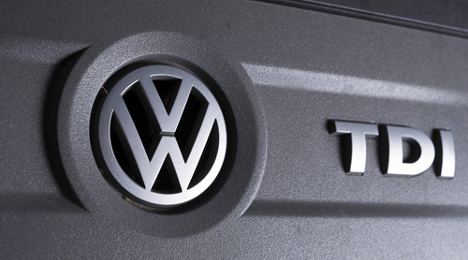Whew, what a day.
Several announcements were made Thursday regarding new and ongoing issues related to three different automakers — and they were quite substantial.
These evolving matters include an update on Volkswagen’s diesel situation, the final report on General Motors’ ignition switch compensations to those affected, and a civil penalty brought against Fiat Chrysler Automobiles by NHTSA.
Starting in Wolfsburg, Germany, Volkswagen AG hosted a conference call early in the day (EST), outlining its continued efforts to realign the company and its brands for increased economic efficiency and transparency to get it back on track financially and regain confidence with its customer base.
While VW AG’s leadership discussed several topics encompassing its current internal and external investigations into both its European CO2-emissions issues as well as its multi-national NOx-emissions issues, one key item of discussion will likely be most important to dealers in the United States: There is still no concrete emedy in place to fix the North American diesel vehicles.
According to a statement by VW, the company said that “due to far stricter nitrogen oxide limits in the United States, it is a greater technical challenge to retrofit the vehicles such that all applicable emissions limits can be met with one and the same emissions strategy.”
While VW officials noted their plans to have the European variants of the TDI engines repaired have been approved by the appropriate authorities and will be handled in various fashions over the course of 2016, VW’s plan for a North American remedy is still awaiting approval from the U.S. Environmental Protection Agency and the California Air Resources Board.
What VW did do, however, is accept the blame for the diesel deceit. A statement from the company explains how it all played out:
The information that has been screened to date has largely explained the origin and development of the nitrogen oxide issue. It proves not to have been a one-time error, but rather a chain of errors that were allowed to happen. The starting point was a strategic decision to launch a large-scale promotion of diesel vehicles in the United States in 2005. Initially, it proved impossible to have the EA 189 engine meet by legal means the stricter nitrogen oxide requirements in the United States within the required timeframe and budget. This led to the incorporation of software that adjusted nitrogen oxide emission levels according to whether vehicles were on the road or being tested. Later, when an effective technical process was available to reduce NOx emissions, it was not employed to the full extent possible. On the contrary, the software in question allowed the exhaust gas treatment additive “AdBlue” to be injected in variable amounts such that the NOx values were particularly low when vehicles were in the test bay, but significantly higher when vehicles were on the road.
Hans Dieter Potsch, the chairman of the supervisory board of VW AG, said that, “No business transaction justifies overstepping legal and ethical bounds.”
“I here and now guarantee that we will pursue our thorough investigation to its conclusion,” Potsch said. “I vouch for this personally, as does the entire supervisory board of Volkswagen AG.”
Final report on GM ignition switch compensation released
Kenneth Feinberg, the attorney heading the compensation process for General Motors, released his final report on Thursday, revealing how many claims were submitted and approved in the ignition switch settlement.
The findings of the report conclude that 124 people were killed in relation to the faulty ignition switches in GM’s compact vehicles. Another 275 were approved to receive compensation for their injuries. The total compensation for payouts from the GM fund that Feinberg administered come out to a total of $594.5 million.
A total of 4,343 claims were submitted to the automaker – less than 10 percent were deemed eligible.
Auto Remarketing reached out to GM on Thursday for an official comment on the findings but has not received a response at the time of this writing.
To check out a full breakdown of the findings, click here.
NHTSA imposes $70 million penalty against FCA
In other news related to recent manufacturer challenges, the U.S. Department of Transportation’s National Highway Traffic Safety Administration issued FCA a $70 million civil penalty on Thursday, citing the company’s failure to report legally required safety data as the impetus.
The penalty befalls FCA following its September admission that it has failed, over the course of several years, to provide Early Warning Report data to NHTSA as required by the TREAD Act of 2000. The administration uses this data, among others, to identify and investigate potential defects that may require a safety recall.
According to NHTSA, FCA has commissioned a third-party audit to determine the full extent of the reporting failures.
“Accurate, early-warning reporting is a legal requirement, and it’s also part of a manufacturer’s obligation to protect the safety of the traveling public,” said U.S. Transportation Secretary Anthony Foxx. “We need FCA and other automakers to move toward a stronger, more proactive safety culture, and when they fall short, we will continue to exercise our enforcement authority to set them on the right path.”
FCA isn’t alone in this realm, however – the company is the fifth automotive manufacturer to be penalized by NHTSA in the last 14 months for failure to meet early warning reporting requirements. These previous penalties have been issued to Honda, Ferrari, Triumph, Forest River and Spartan Motors.
While Volkswagen has been facing NOx-emission-related issues in North America for its diesel vehicles, the company has also been handling a CO2-emission-related issue in Europe. Wednesday, the company says that issue is “largely concluded.”
Questions arose from the German government’s Federal Motor Transport Authority a month ago estimating that approximately 800,000 vehicles manufactured by VW’s various companies were under suspicion for producing higher levels of CO2 emissions and achieving lower fuel efficiency than originally posted.
Today, VW admits that the discrepancy was factual but that it only affects approximately 36,000 vehicles from nine model variants in Europe. They also reaffirm that no unlawful change has been made to the vehicles’ stated fuel consumption or their CO2 figures and that the handful of vehicles that were found with discrepancies will have their catalogues updated to reflect more accurate figures.
According to VW, the only deviations found in the figures for the nine model variants amount to a few grams of CO2 on average, and that the nine models account for only 0.5 percent of the volume of the VW brand. VW also says that none of the vehicles have misrepresented fuel economies.
VW plans to have all of the affected model variants remeasured by a neutral technical service under the supervision of the appropriate authority by Dec. 25.
To reiterate, this issue is contained to Europe and does not include products and services provided by Volkswagen Group of America or Volkswagen Canada or any of their North American affiliates.
In other VW news, VW AG will host a live press conference tomorrow morning to provide "information on the current status of the clarification process concerning the diesel issue and on the realignment of the group." Those in North America that are curious and early-to-rise can check out a live stream of the press conference at 4:20 a.m. EST here.
Chrome Data Solutions, in partnership with SpinCar, have collaborated to create a 360-degree vehicle rotation platform to enhance vehicle description pages.
Perhaps the most striking feature that differentiates the tool from other similar offerings is the inclusion of “hot spots,” which allow the seller to highlight features of each vehicle and provide the customer another way to learn about the vehicle and interact with the VDP.
"SpinCar has a track record of bringing high-performing merchandising solutions to the automotive space,” said Devin Daly, SpinCar’s chief executive officer. “With the help of Chrome Data's reputation and network of industry partners, we will be able to deliver these solutions at scale much more easily and quickly. This will have a powerful impact on dealership leads and sales.”
Through the partnership, Chrome Data and SpinCar will provide two new dealership products, as described below by the companies:
- Stock Image Gallery Tool leverages Chrome Data's comprehensive library of stock imagery along with SpinCar's proprietary merchandising technology to give portals, resellers, and dealers a state-of-the-art way to show off their unique vehicles, via interactive 360-degree interior/exterior views and hotspots, while gathering unprecedented user interaction data.
- Dealer Inventory Image Tool allows dealers to showcase actual inventory in an engaging and interactive way, and take advantage of a solution which has had impressive success in the automotive space after a strong beginning in retail ecommerce.
"SpinCar offers a best-of-breed merchandising solution that has incredible impact on website performance," said Andrew Lumsden, vice president of Chrome Data’s Product and IP Licensing Group. "We're excited to combine proven SpinCar technology with our industry-leading images to give dealers a solution that truly captures the in-store experience for online shoppers."
Virginia Gov. Terry McAuliffe announced Tuesday that Carfax plans to invest a total of $15.8 million to expand its headquarters and upgrade its nearby data center operation.
Expecting to create 120 new jobs, Carfax’s current plans include a $5 million investment to expand its Fairfax County headquarters in Centreville, Va., as well as a further $10.8 million investment to upgrade its data center in nearby Loudoun County.
“Carfax is a great example of a company that is diversifying the Fairfax County economic base as it grows,” said Gerald Gordon, the president and chief executive officer of the Fairfax County Economic Development Authority (FCEDA). “This is a leading firm in the automotive sector that is taking full advantage of the excellent workforce we have, and I am delighted to see that the company is expanding its data center capabilities in the Commonwealth as well as expanding its headquarters here.”
Dick Raines, Carfax’s president, explained some of the thought process involved behind bolstering his company’s infrastructure.
“Fairfax County is a special place that has been home to Carfax for more than 20 years,” Raines said. “With ready access to the I-66 corridor, our corporate headquarters in Centreville has proven a desirable location for our staff, the majority of whom call the county home. We’ve maintained a diverse workforce, with myriad career opportunities in sales, marketing, account management, business development, technology, product management, IT, finance, and legal. Our staff consistently votes us a best place to work and a big part of that success is made possible by our residence in Fairfax County.”
According to the FCEDA, it worked with the Virginia Economic Development Partnership to secure the headquarters expansion for Virginia. McAuliffe approved a $150,000 grant from the Commonwealth Opportunity Fund to assist Fairfax County with the project; funding and services to support the company’s employee training activities will be provided through the Virginia Jobs Investment Program.
Amid quickly approaching holidays and the close of another year, the International Automotive Remarketers Alliance has a reminder for those looking for something new in 2016: Membership enrollment in IARA begins Jan. 1.
IARA is encouraging existing and prospective members to visit its website to take advantage of the January membership enrollment.
Current members simply click “Pay Your Membership Dues,” while new members click “Join IARA.”
More information can be found at www.iaraonline.org or by contacting executive director Tony Long at (865) 805-5954, membership chairman Tom Wright at (269) 217-3532 or emailing [email protected].
The Larry H. Miller Group of Companies — a group that includes the Larry H. Miller Dealerships, among many other business entities — announced the release of “Behind the Drive: 99 Stories from the Life of an American Entrepreneur” on Friday, a collection of stories passed down about Larry H. Miller and written by his son, Bryan Miller.
According to the company, the book is the fulfillment of a promise that Bryan Miller made to his father prior to his passing away in 2009 due to complications from type II diabetes: to learn from his father’s successes and shortcomings and to share those lessons.
“The stories have the power to lift and inspire the next generation of leaders, as well as help everyone discover Larry’s formula for success: Do work you love, get better at it every day and serve others,” Miller said.
“Behind the Drive” contains 99 stories from the lesser-known aspects of Larry H. Miller’s life, including a forward from Mitt Romney as well as contributions from retired NBA commissioner David Stern; former Utah governor Jon Huntsman, Jr.; former Utah governor and administrator of the EPA Michael O. Leavitt; former NBA players Jerry Sloan, John Stockton and Karl Malone; and religious figure Elder M. Russell Ballard.
In conjunction to the book’s release, the Larry H. Miller Group of Companies has donated $100,000 to support the Stop Diabetes movement.
Following Larry H. Miller’s own autobiography, ”Driven: An Autobiography,” his son’s collection of stories about his father’s life was released for sale on Friday and is available for purchase online at Amazon.com and Barnes & Noble as well as in-person at Deseret Book stores.
Would it surprise you to find out that members of the Generation Y cohort may actually “love” their vehicles, on average, more than other generations?
That was the finding of Strategic Vision’s research on the subject, which they began after identifying “love” as the “holy grail of the customer experience.”
This led to the creation of its “Customer Love Index,” or CLI, to determine which vehicles are most loved by their owners.
According to the company’s quantitative New Vehicle Experience Study, which surveyed feedback from over 44,000 new-vehicle owners, the average CLI score came out to about 400. Millennials came in at 470.
They also found that these millennials are much more likely to purchase mass-market vehicles that weren’t necessarily designed to be “loved,” while also “loving” them just as much, or more, than other generations love more expensive vehicles.
According to Strategic Vision, though, this is nothing new, and shouldn’t be viewed as something millennial-specific — more often than not, the younger generations have tended to be more enthusiastic about such things.
“As new younger buyers enter any market they essentially crush hard on their choices, believing that their first love will always be their only,” said Christopher Chaney, senior vice president of Strategic Vision. “Of course, this isn’t new to millennials. Every generation in their youth can remember their first love and the deep emotional impact it had on their lives, and future decisions in life.”
Looking at the overall results, the Porsche Macan scored the highest on the CLI rankings, coming in at a score of 629, one of only two vehicles to score over 600 (the other being the Chevrolet Corvette convertible).
Which segment had the least love? While it was a vehicle in the minivan category that scored the lowest overall when separated by segment-leaders, Strategic Vision pointed out that, overall, minivans obtained higher CLI scores than most of the hybrid vehicles surveyed.
“Most U.S. customers will not spend more than an additional $50 per month for a vehicle just for MPG enhancing or environmentally friendly powertrain,” said Alexander Edwards, Strategic Vision’s president. “Instead, creating a product that customers can love will allow buyers to spend significantly more money because it has the right balance of styling, innovation, performance and environmental friendliness.”
Without further ado, here’s the full list, provided by Strategic Vision.
Strategic Vision's Customer Love Index Segment Winners
| Segment |
Winner(s) |
CLI Score |
| Micro Car |
Fiat 500 |
449 |
| Small Car |
Mazda3 Sedan |
438 |
| Small Multi-function Car |
Kia Soul |
408 |
| Small Alternative Powertrain (APT) Car |
Fiat 500e |
408 |
| Midsize Car |
Subaru WRX |
451 |
| Midsize Multi-function Car |
Subaru Outback |
408 |
| Midsize APT Car |
Toyota Prius / Toyota Camry Hybrid |
354 |
| Full-size Car |
Dodge Charger |
543 |
| Near-luxury Car |
Mercedes-Benz CLA-class |
564 |
| Near-luxury APT Car |
BMW i3 |
474 |
| Luxury Car |
Mercedes-Benz S-Class Sedan |
563 |
| Luxury Multi-function Car |
BMW 3-Series GT |
466 |
| Specialty Coupe |
MINI Cooper Hardtop |
547 |
| Premium Coupe |
Chevrolet Corvette Coupe |
598 |
| Standard Convertible |
Ford Mustange Convertible |
564 |
| Premium Convertible/Roadster |
Chevrolet Corvette Convertible |
617 |
| Standard Pickup |
Chevrolet Colorado |
423 |
| Full-size Pickup |
Nissan Titan |
482 |
| Heavy Duty Pickup |
GMC Sierra 2500/3500 |
467 |
| Entry SUV |
Jeep Renegade |
490 |
| Entry CUV |
Hyundai Tucson |
451 |
| Mid-size SUV |
Dodge Durango |
465 |
| Mid-size CUV |
Ford Flex |
460 |
| Full-size Utility |
GMC Yukon XL |
483 |
| Near-luxury Utility |
Land Rover Range Rover Evoque 5-door |
516 |
| Luxury SUV |
Infiniti QX80 |
524 |
| Luxury CUV |
Porsche Macan |
629 |
| Minivan |
Kia Sedona |
391 |
One final point of interest: while not reflected in the chart above, the manufacturer with the lineup of vehicles with the highest overall CLI scores was Volkswagen Group of America. Strategic Vision felt it was important to point out that this finding was based on data collected prior to September 2015.
According to a release from Strategic Vision regarding the finding, they had the following message on the subject: “The good news for VWGoA is that they will be working from a position where customers have initially loved their experience. When love is lost, that’s when the real work begins.”
A recent study commissioned by the National Automobile Dealers Association reveals that vehicle trade-in values could decline by an average of $1,210 if legislation were to pass that forbade dealers from selling used-vehicles with open recalls.
The J.D. Power study, which NADA commissioned, is titled “An Economic Assessment of Trade-In Value Reduction Caused by Preventing Auto Dealers from Selling Passenger Vehicles with any Open Recall.”
It estimates that the value of some vehicles could decline by as much as $5,713.
The report was commissioned in response to proposed legislation earlier this year from Sen. Richard Blumenthal, D-Conn., titled as the “Used Car Safety Recall Repair Act,” that would ground used-vehicles with open recalls from being sold or leased until a remedy has been enacted. The act was voted down during a U.S. Senate Committee on Commerce, Science, & Transportation markup hearing this summer.
Jonathan Banks, the author of the report and the executive analyst at the Used Car Guide division of J.D. Power, says, among other issues, that the unknown amount of time to reach each individual remedy really throws a wrench in the pricing and remarketing process.
"Assuming a repair delay that is shorter than the actual repair delay is a risky proposition for a dealer, and thus they are more likely to act as if they believe the range of repair delays will be on the high end of the range of repair delays observed in the past for recalls of similar scale and complexity," Banks explained. "In a hypothetical scenario, a lack of clear information could reduce the trade-in value offered to a consumer by hundreds of dollars if a trade-in manager were to overestimate a 30-day recall delay by an additional 30 days."
The report reached that $1,210 average price decline by weighing the average based on both in-brand trade-ins and out-of-brand trade-ins, the latter of which has to factor in the additional costs incurred from holding a vehicle until the repair can be made by transporting the vehicle to an in-brand dealer.
If you’d like to download the full report, click here.
On Monday, FCA US highlighted the national rollout of its Degrees@Work program and the newly developed Degrees@Work Family offering with Strayer University, designed to provide a no-cost, no-debt college degree to participating brand dealership employees and their immediate family members.
The automaker believes FCA US is not only the first and only company in the automotive industry to offer the programs, but it’s also the first U.S. company of any type to provide a no-cost, no-debt college degree to both employees and their immediate families.
Officials hope the expanded Degrees@Work program and the new Degrees@Work Family offering will enable FCA US dealerships to attract top talent, improve the skillset of existing employees, lessen the burden of paying for college for families and significantly increase employee retention.
“After the success of the initial regional launch, we’re thrilled to expand the benefit not only to all of our dealerships nationwide, but also to dealership employees’ immediate family members," said Al Gardner, the OEM’s head of dealer network development.
“When we began to seek out a partner to provide education benefits to our employees and their families, we focused on finding a top-notch institution,” Gardner said. “Strayer has the resources and the experience to provide a world-class education to our employees and their families.”
Strayer University, which is accredited by the Middle States Commission on Higher Education, will offer associate, bachelor’s and master’s degrees to all participating FCA US dealership employees and their immediate family members. Strayer University is a postsecondary institution with a more than 120-year history educating working adult students online and at campus locations across the country.
“We are proud to partner with a true innovator like FCA US to offer this first-of-its-kind employee benefit,” said Karl McDonnell, chief executive officer of Strayer Education, which owns Strayer University.
“At Strayer, we’re dedicated to improving the way education and business work together. We’re thrilled to continue our partnership with FCA US to tackle college affordability and the skills gap head on,” McDonnell continued.
The automaker went on to mention the program was developed using input from dealers and their employees. Depending on the selected program of study, courses will range from business administration and accounting to education, information systems and other areas.
Courses will be offered online with 24/7 access for flexibility around work schedules, as well as at Strayer's campus locations throughout the United States.
Dealers’ employees can have their training and work experience evaluated for college credit to accelerate completion of a degree program.
“Families are often faced with tough choices about how to pay for college,” Gardner said. “Expanding this benefit to employees’ immediate family members positions our dealer network as the 'employers of choice.’”
For more information, watch the video at the top of this page or visit http://fcadegrees.strayeruniversity.edu.
Kevala Analytics has developed a digital tool that displays the registration location of every non-compliant Volkswagen diesel vehicle in the state of California, juxtaposing the location of these vehicles with the areas of California with the highest levels of pollution and poverty in the state.
Danny Kennedy, the managing director of the California Clean Energy Fund, believes comparing where these vehicles are primarily located may have some sort of correlation to the income and diversity levels of the areas.
“This scandal presents an opportunity to bring solutions to those who are suffering the most from dangerously dirty air,” Kennedy said. “This map shows those most impacted by VW’s malfeasance live in poorer communities and communities of color, which bear the burden of some of our state’s highest rates of air pollution. VW has the power to begin to correct that injustice by expanding access to clean transportation in these neighborhoods.”
Curious? Check out the map for yourself here to form your own opinion.
“Figuring out where the VW diesels are and are likely to go is a key part of addressing this problem,” said Ethan Sprague, vice president of sales and business development at Kevala. “If we can see where the damage is being done, we’re better able to figure out how to address it – and that's what makes this map so powerful. It brings together key data to tell the Volkswagen story in a new way, and helps users conceptualize how Volkswagen could make up for the harm it caused.”












